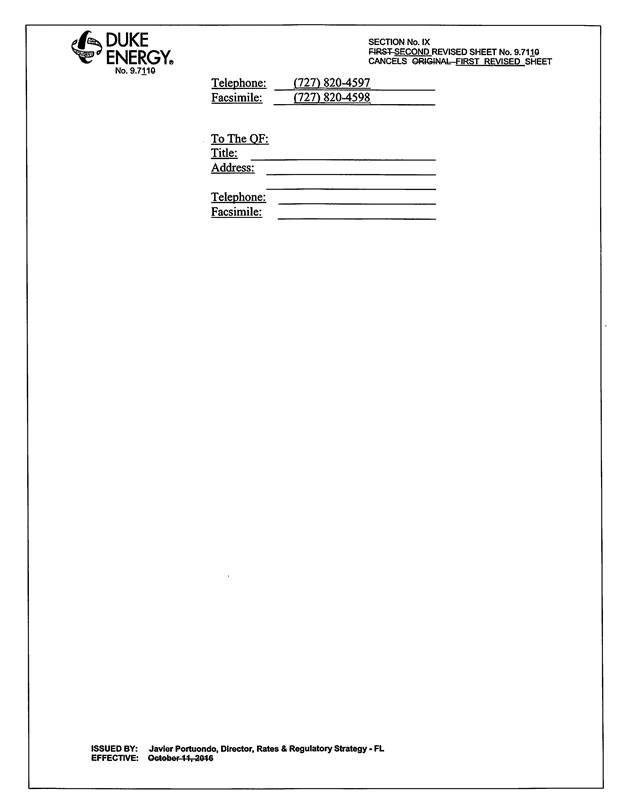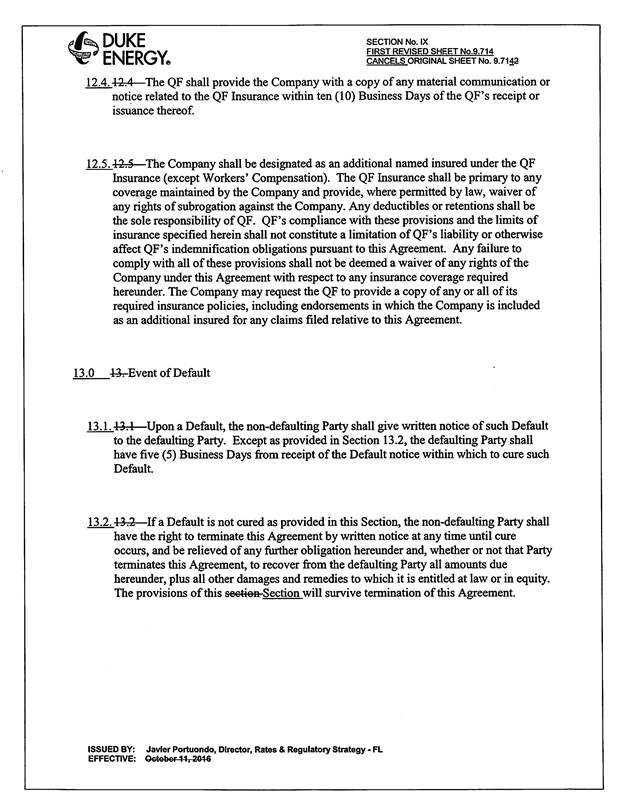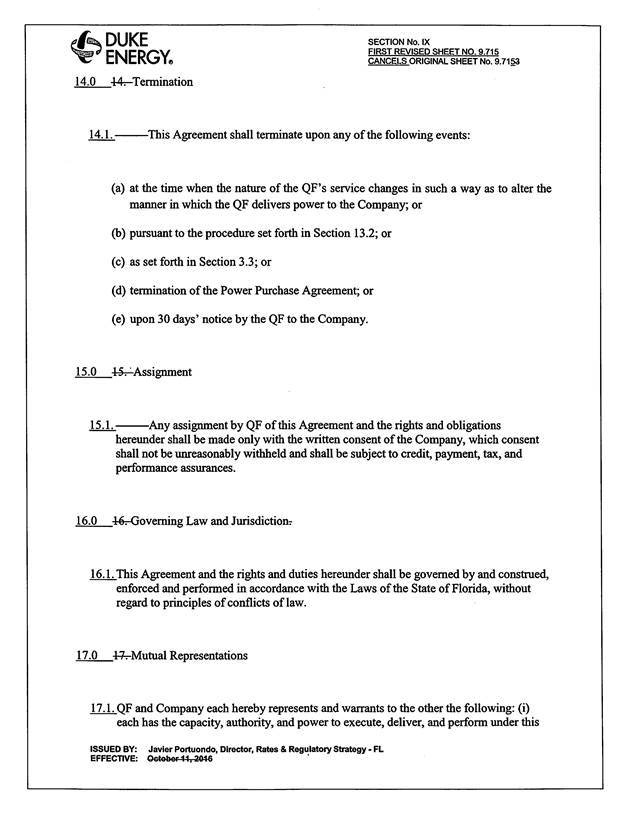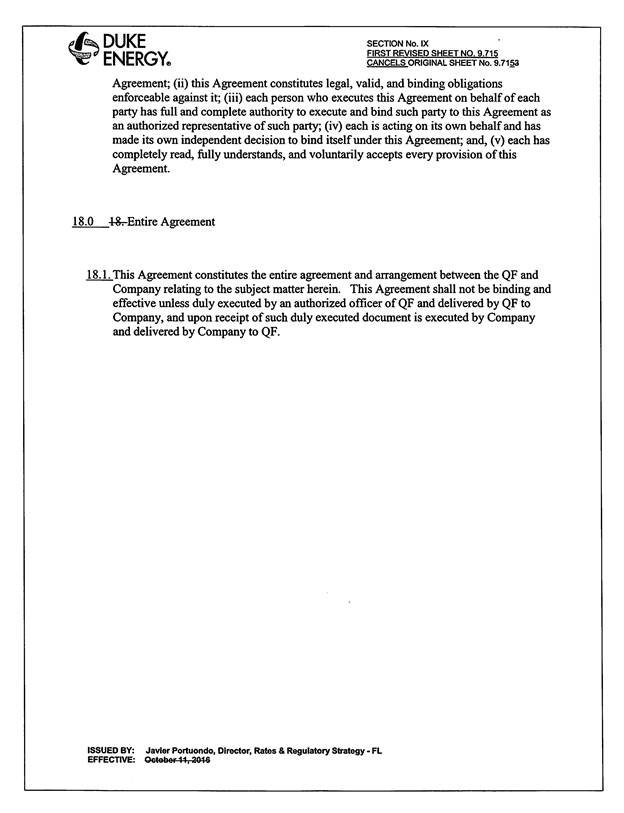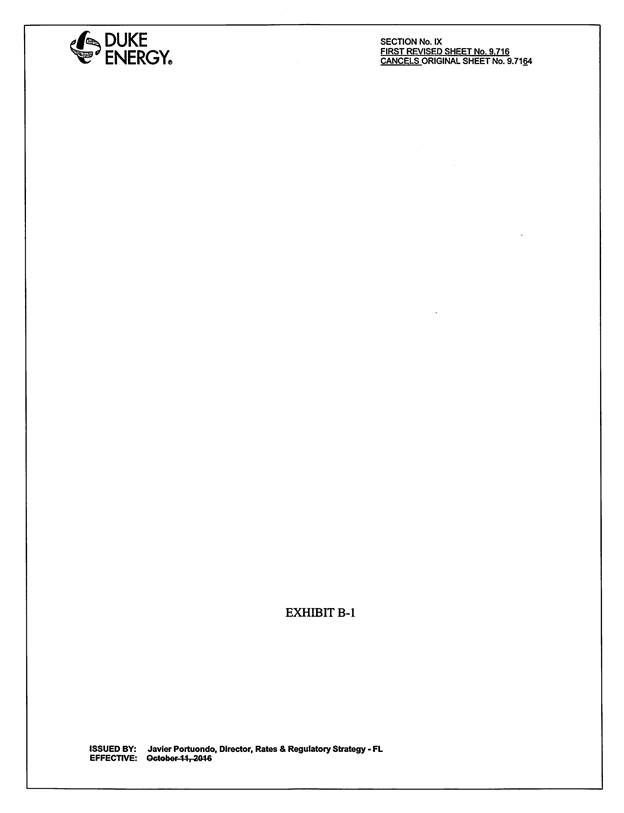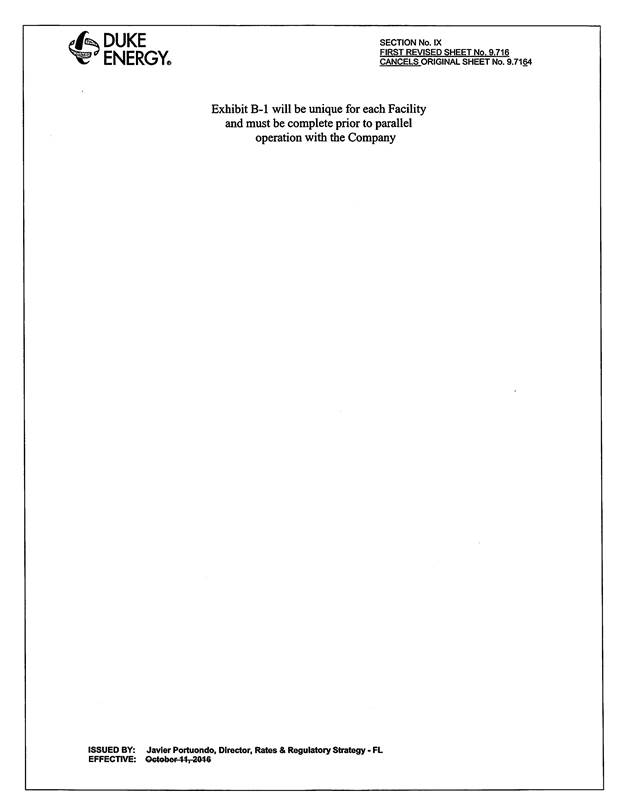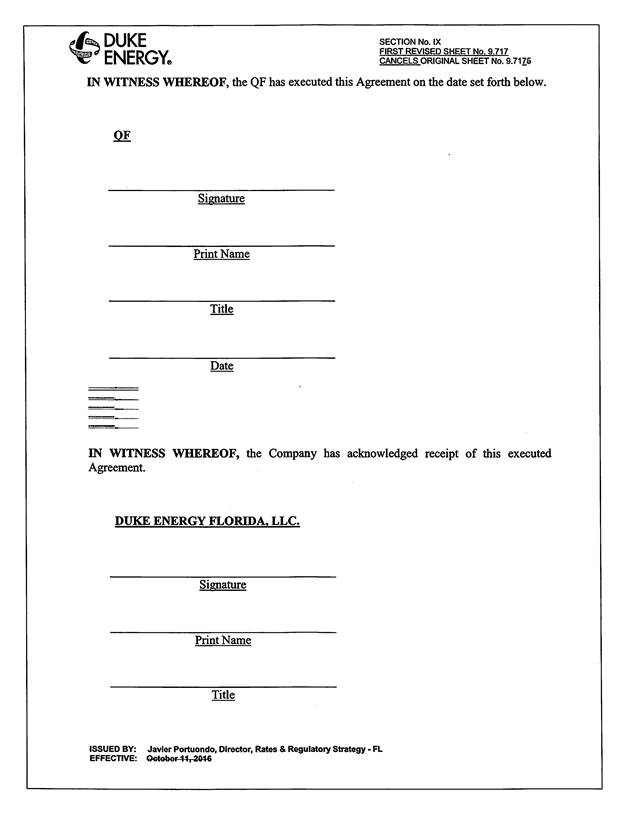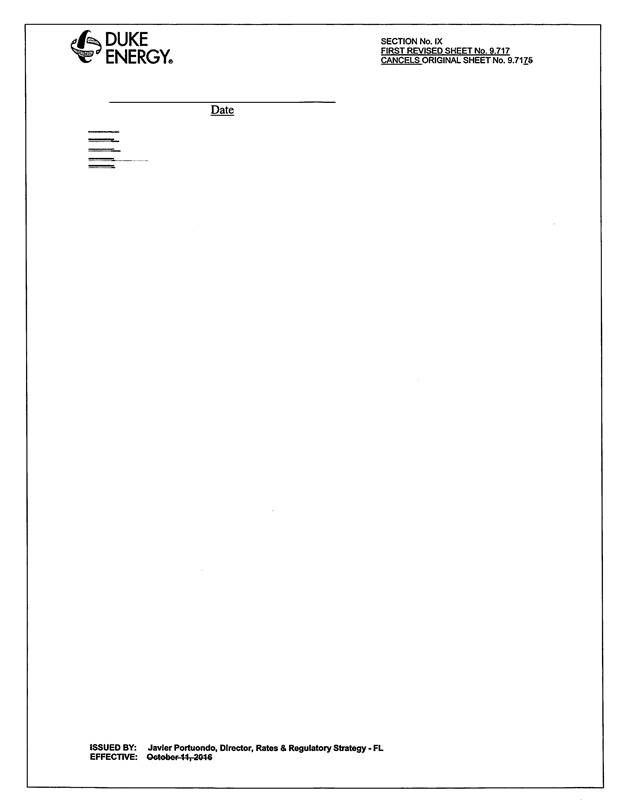Discussion
of Issues
Issue 1:
Should the Commission approve the amended standard
offer contract, filed on July 14, 2017, and associated rate schedule and
amended interconnection agreement filed by Duke Energy Florida?
Recommendation:
Yes. The provisions of the amended standard offer
contract and associated rate schedule, along with the updated interconnection
agreement, conform to all requirements of Rules 25-17.200 through 25-17.310,
F.A.C. and address the concerns raised at the July 13, 2017 Commission
Conference. The amended standard offer contract provides flexibility in the
arrangements for payments so that a developer of renewable generation may
select the payment stream best suited to its financial needs. The updated
interconnection agreement provides the Utility an opportunity to limit the
physical capacity of any new connection based on testing results. Staff recommends
that the revisions to the rate schedule and standard offer contract, as well as
the updated interconnection agreement be approved as filed. (Ellis)
Staff Analysis:
Standard Offer Contract
Rule 25-17.250, F.A.C., requires that DEF, an IOU,
continuously makes available a standard offer contract for the purchase of firm
capacity and energy from renewable generating facilities (RF) and small
qualifying facilities (QF) with design capacities of 100 kilowatts (kW) or
less. Pursuant to Rule 25-17.250(1) and (3), F.A.C., the standard offer
contract must provide a term of at least 10 years, and the payment terms must
be based on the Utility’s next avoidable fossil-fueled generating unit
identified in its most recent Ten-Year Site Plan or, if no avoided unit is
identified, its next avoidable planned purchase. DEF has identified a 228 MW
natural gas-fueled combustion turbine (CT) facility as its next planned
generating unit in its 2017 Ten-Year Site Plan. The projected in-service date
of the unit is June 1, 2024.
The RF/QF operator may elect to make no commitment as to
the quantity or timing of its deliveries to DEF, and to have a committed
capacity of zero (0) MW. Under such a scenario, the energy is delivered on an
as-available basis and the operator receives only an energy payment. Alternatively, the RF/QF
operator may elect to commit to certain minimum performance requirements based
on the identified avoided unit, such as being operational and delivering an
agreed upon amount of capacity by the in-service date of the avoided unit, and
thereby become eligible for capacity payments in addition to payments received
for energy. The standard offer contract may also serve as a starting point for
negotiation of contract terms by providing payment information to an RF/QF
operator, in a situation where one or both parties desire particular contract
terms other than those established in the standard offer.
In order
to promote renewable generation, the Commission requires each IOU to offer
multiple options for capacity payments, including the options to receive early
or levelized payments. If the RF/QF operator elects to receive capacity
payments under the normal or levelized contract options, it will receive
as-available energy payments only until the in-service date of the avoided unit
(in this case June 1, 2024), and thereafter begin receiving capacity payments
in addition to the energy payments. If either the early or early levelized
option is selected, then the operator will begin receiving capacity payments
earlier than the in-service date of the avoided unit.
However,
payments made under the early capacity payments options tend to be lower in the
later years of the contract term because the net present value (NPV) of the
total payments must remain equal for all contract payment options.
Table 1
below, estimates the annual payments for each payment option available under
the amended standard offer contract to an operator with a 50 MW facility
operating at a capacity factor of 95 percent, which is the minimum capacity factor
required under the contract to qualify for full capacity payments. Normal and
levelized capacity payments begin in 2024, reflecting the projected in-service
date of the avoided unit (June 1, 2024).
Table 1 – Estimated Annual Payments to
a 50 MW Renewable Facility
(95% Capacity Factor)
|
Year
|
Energy Payment
|
Capacity Payment (By Type)
|
|
Normal
|
Levelized
|
Early
|
Early Levelized
|
|
$(000)
|
$(000)
|
$(000)
|
$(000)
|
$(000)
|
|
2018
|
10,914
|
-
|
-
|
-
|
-
|
|
2019
|
8,896
|
-
|
-
|
-
|
-
|
|
2020
|
7,374
|
-
|
-
|
-
|
-
|
|
2021
|
7,703
|
-
|
-
|
-
|
-
|
|
2022
|
8,159
|
-
|
-
|
2,003
|
2,321
|
|
2023
|
8,417
|
-
|
-
|
2,054
|
2,324
|
|
2024
|
8,784
|
1,529
|
1,751
|
2,105
|
2,328
|
|
2025
|
9,122
|
2,687
|
3,007
|
2,158
|
2,332
|
|
2026
|
9,518
|
2,754
|
3,012
|
2,211
|
2,335
|
|
2027
|
9,654
|
2,823
|
3,016
|
2,267
|
2,339
|
|
2028
|
9,856
|
2,894
|
3,021
|
2,323
|
2,343
|
|
2029
|
10,073
|
2,966
|
3,026
|
2,382
|
2,347
|
|
2030
|
10,307
|
3,040
|
3,032
|
2,441
|
2,351
|
|
2031
|
10,801
|
3,116
|
3,037
|
2,502
|
2,356
|
|
2032
|
11,373
|
3,194
|
3,042
|
2,565
|
2,360
|
|
2033
|
11,738
|
3,274
|
3,048
|
2,629
|
2,365
|
|
2034
|
12,126
|
3,356
|
3,054
|
2,694
|
2,369
|
|
2035
|
12,728
|
3,440
|
3,060
|
2,762
|
2,374
|
|
2036
|
13,245
|
3,526
|
3,066
|
2,831
|
2,379
|
|
2037
|
13,811
|
3,614
|
3,072
|
2,902
|
2,384
|
|
Total
|
204,600
|
42,211
|
41,244
|
38,828
|
37,606
|
|
NPV (2018$)
|
100,862
|
16,647
|
16,647
|
16,647
|
16,647
|
Source: DEF’s Response to Staff’s First Data Request
Along with the updated avoided
unit and payment information, DEF’s 2017 amended standard offer contract
includes content not seen in previous versions. Section 6.3 requires any RF/QF
wishing to sell environmental attributes (EAs) to provide notice to DEF of its
intent to sell the EAs, along with a “reasonable opportunity to offer to
purchase such EAs.” In its first data request, staff asked DEF to provide an
explanation of the term “reasonable opportunity,” along with a discussion of
how this term relates to the right of first refusal which was expressly
disallowed in standard offer contracts. DEF responded that a reasonable
opportunity simply means that it would have the same opportunity to purchase
the EAs at the same terms and conditions as any other potential purchaser, and
that the term “reasonable opportunity” does not rise to the level of a right of
first refusal. Staff is persuaded that the inclusion of this section does not
conflict with the Commission’s intent.
As agreed to by DEF at the July
13, 2017 Commission Conference, the standard offer contract filed on July 14,
2017, removes potential conflicting language that was originally proposed in
Section 6.2. In addition, DEF has revised Section 11.4 to return Completion/Performance
security deposits once certain conditions are met. Therefore, this version
addresses the concerns expressed by the Commission at the July 13, 2017
Commission Conference.
Interconnection Agreement
The updated interconnection agreement contains two notable
revisions. The first revision is a requirement that, in order to proceed with
the project, the RF/QF must provide DEF with written notification of its intent
to continue to the next study phase of the project after each previous study
phase is completed, and also of its intent to proceed with construction. The
second revision is a section noting DEF’s right to limit the physical capacity
of any RF/QF connection based on the results of static and dynamic testing.
The type-and-strike format versions of the amended
standard offer contract and associated rate schedule, as well as the updated
interconnection agreement, are included as Attachment A to this recommendation.
All of the changes made to DEF’s tariff sheets are consistent with the updated
avoided unit.
Conclusion
The provisions of DEF’s amended standard offer contract
and associated rate schedule, as revised on July 14, 2017, conform to all
requirements of Rules 25-17.200 through 25-17.310, F.A.C. and address the
concerns raised at the July 13, 2017 Commission Conference. The amended
standard offer contract provides flexibility in the arrangements for payments
so that a developer of renewable generation may select the payment stream best
suited to its financial needs. The updated interconnection agreement provides
the Utility an opportunity to limit the physical capacity of any new connection
based on testing results. Staff recommends that the revisions to the rate
schedule and standard offer contract, as well as the updated interconnection
agreement be approved as filed.
Issue 2:
Should this docket be closed?
Recommendation:
Yes. This docket should be closed upon issuance of a
consummating order, unless a person whose substantial interests are affected by
the Commission’s decision files a protest within 21 days of the issuance of the
Commission’s Proposed Agency Action Order. Potential signatories should be
aware that, if a timely protest is filed, DEF’s standard offer contract and
interconnection agreement may subsequently be revised. (Cuello)
Staff Analysis:
This docket should be closed upon the issuance of a
consummating order, unless a person whose substantial interests are affected by
the Commission’s decision files a protest within 21 days of the issuance of the
Commission’s Proposed Agency Action Order. Potential signatories should be
aware that, if a timely protest is filed, DEF’s standard offer contract and
interconnection agreement may subsequently be revised.







































































































